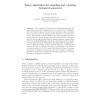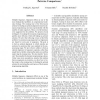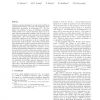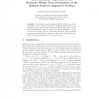8431 search results - page 80 / 1687 » Algorithmically Independent Sequences |
138
click to vote
BMCBI
2011
14 years 5 months ago
2011
Background: Next-generation sequencing (NGS) offers a unique opportunity for high-throughput genomics and has potential to replace Sanger sequencing in many fields, including de-n...
120
click to vote
SPIRE
2009
Springer
15 years 6 months ago
2009
Springer
Abstract. A set of sequences S is pairwise bounded if the Hamming distance between any pair of sequences in S is at most 2d. The Consensus Sequence problem aims to discern between ...
122
click to vote
WABI
2005
Springer
15 years 7 months ago
2005
Springer
Multiple Sequence Alignment (MSA) is one of the most fundamental problems in computational molecular biology. The running time of the best known scheme for finding an optimal ali...
110
click to vote
RECOMB
1997
Springer
15 years 6 months ago
1997
Springer
Multiple sequence alignment is an important problem in computational biology. We study the Maximum Trace formulation introduced by Kececioglu [?]. We first phrase the problem in ...
117
Voted
PPSN
2004
Springer
15 years 7 months ago
2004
Springer
Abstract. The multiple sequence alignment problem (MSA) can be reformulated as the problem of finding a maximum weight trace in an alignment graph, which is derived from all pairw...




